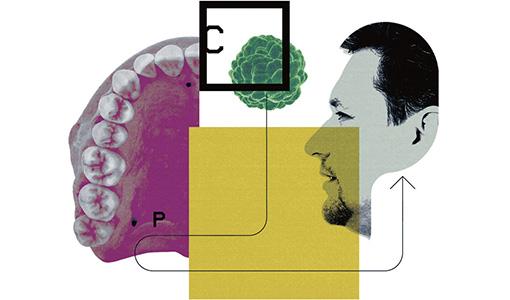-
About
-
Academics
- Physician Assistant
- Special Master’s (MBS)
-
Admissions & Financial Aid
- Tuition & Fees
-
Student Life
-
Research
- Research Labs & Centers
-
Local & Global Engagement
- Global Health Program
A Cancer Clue?
Researchers from Tufts University School of Medicine, led by Dominique Michaud, professor of public health and community medicine, have found a positive association between severe gum disease and an increased risk of cancer.

By Courtney Hollands
File this under important reasons for flossing and scheduling regular cleanings: After reviewing 46 publications examining the relationship between oral health and risk of cancer, Tufts researchers found positive associations between gum disease and lung, pancreatic, and head and neck cancers.
This is especially concerning considering how widespread periodontitis is in the United States, said Dominique Michaud, professor of public health and community medicine at the School of Medicine, and lead author of the paper published in Epidemiologic Reviews. Around 47 percent of adults over age 30 have periodontitis and the prevalence increases with age to 70 percent in individuals 65 years and older.
More studies are needed to understand the exact biological underpinnings of the associations—and the possible role of gum disease in cancer development. “Whether the impact of periodontal disease on cancer risk is a direct effect or a consequence of shared genetic and/or environmental factors is extremely difficult to untangle,” Michaud and her team write in their large-scale review. Questions abound: Could the systemic inflammation that comes with periodontal disease be a culprit? Are the bacteria responsible for periodontitis altering the immune response in other organs?
After investigating periodontal disease and cancer risk for a decade and analyzing other recent work in the field, Michaud has advice for future studies: larger sample sizes; improved measures for periodontal disease (though radiographs and oral exams are considered the most accurate gauges, many of the studies Michaud’s team looked at relied on self-reporting); and better adjustment for smoking and other risk factors. “That was our motivation,” she said. “To gather as much data as we could to move the field forward and bring attention to it for others to do more research.”
And as evidence linking periodontal disease and cancer risk accumulates, the research could lead to public health recommendations and policy changes, Michaud said. Identifying individuals or populations with an elevated risk of cancer through periodontal disease status may help inform treatment and prompt dentists to refer patients for cancer screenings. “Whether [periodontal disease] causes cancer, I can’t say for sure yet,” she said, “but it’s important to make patients aware of their periodontal disease status and encourage them to treat it.”
This article originally ran in the Winter 2018 issue of Tufts Medicine.
Department:
Public Health and Community Medicine